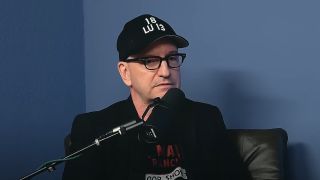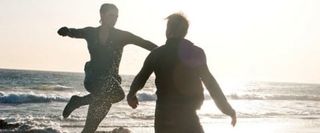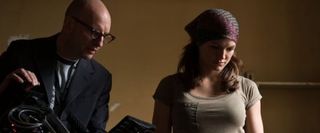Steven Soderbergh On Haywire And Creating The Anti-James Bond Heroine

It's amazing how fast an hour can go by when Steven Soderbergh was talking. Offered a small roundtable interview with the director of this week's action thriller Haywire, I expected the usual rushed 20 minutes of questions about the new movie, with maybe a few nods to his next movie Magic Mike, or the retirement that he says will start next spring. Then I sat down in a room with Soderbergh and six other journalists, and the conversation went on more than an hour, spanning Soderbergh's entire career, his childhood in Virginia, his ambitions with Haywire, and yes, his retirement plans. The director who sometimes makes two features in a single years and seems capable of tackling any genre never ran out of answers or let his energy flag. The director who insists that every single one of his movies are "one for me" and not for the studio never lacked for insight on his own work or the Hollywood system he's preparing to back away from.
Obviously an hourlong transcript isn't something anyone would want to read, but there was so much good stuff in there that I couldn't bear to cut it down to regular length. So we're going to do this in two parts. First up today is the Haywire stuff, in which Soderbergh talks about casting MMA fighter Gina Carano, why he wanted to tell a story about a woman operating in a world dominated by men, which scene in the movie he thinks is pretty much perfect, and how he told Michael Fassbender he needed to feel comfortable hitting a woman in the face. Tomorrow comes the rest of the interview, with the wide-ranging conversation about Soderbergh's early career, his frustrations with the test screening process, and how his feeling about retirement is similar to what led to Out of Sight and the hugely successful second half of his career.
Read below for the Haywire stuff, and hang in there-- this is a long read that's very much worth the time.
What made you want to make this?
It really was because of [Gina]. If she had said no, then I wouldn't have thought, "oh, well I still want to go and do this." She was the reason to do the movie for me.
How did you go about building the movie around her?
That's why I called Lem. Immediately I thought, oh, in terms of its tone, it should be sort of like The Limey. It should be sort of terse, very lean. i liked the idea of a fractured narrative that had a loop you finally caught up to. I just called him up and said, go on YouTube, check out this woman. It's pretty straightforward. The idea was, she's in the private security world, she's working for one of those Blackwater type companies. Something goes wrong, she's got to go on the run, and sort of beat her way through the cast. You're just looking for a sort of simple construct. It didn't take us long to sort of figure out what the basic shape of it was.
CINEMABLEND NEWSLETTER
Your Daily Blend of Entertainment News
Was there a worry about what she could accomplish as an actor?
I knew we had to look at her as a female version of Clint Eastwood. The character had to be sort of in that vein. We didn't need her to burst into tears or deliver a two-page monologue, she just need to be cool. The thing that really convinced me is I saw her interviewed, and I really liked her. She's really genuine, very unpretentious. She seemed resolutely grounded and charming. She's a very ebullient personality, and she didn't really get much opportunity to do that here. She just had a great vibe. She was very watchable.
It's a big risk to build this movie around her.
Maybe. Look, everything is a risk. Look at the last year, where you've got big movies with movie stars that aren't working. i was also aware of the fact that she has a huge fan base. When we did Comic Con, at the end of the day she was like the fifth-most Googled person in the world. There's no guarantee those people are going to show up, but I knew she was kind of a magnet for the kind of attention you can build on.

How did you cast the guys opposite Gina?
It wasn't just a matter of A-list talent. It had to be A-list talent who could go toe-to-toe with her. I had to have three guys who could really fight with her. I knew Channing could do that, I knew Fass could do it, and then I had Obi-Wan Kenobi.
Yeah, I don't know if I've seen [Ewan McGregor] in fisticuffs like that.
He really wanted to do it. That's something we did after I had seen a first cut of the movie.
Is reshooting something you do often?
I love it. I do it on every movie, including sex, lies. We budget for it. It's fantastic, because you've seen it, you know what you shoot is going to be in the movie.
There's such a stigma.
That's so stupid. Who hands in a novel and goes, "I'm not changing a word of this."
She takes control in all the fight scenes, but I can't remember the last time I saw a woman get beat up that fiercely by men. Were you trying to break some ground there?
The point was, to me, to in essence de-genderize her, and to not be patronizing by treating her any differently than I would a male character. That was my attitude. Don't do anything with her you wouldn't do with a guy. It would be insulting to tell the guys, "Don't hit her in the face because she's a woman." I asked Fassbender when I sent him the script, "Are you going to have a problem hitting a woman in the face as hard as you can?" and he laughed and said "I don't think so." You've got to be that guy, as did Channing. And I liked that she takes it and she dishes it out, and Gina would be the first person to say, "You have to do it this way." And she was also the person on the set saying "You have to hit me harder."
She's operating this world completely dominated by men. Her future is largely determined by the decisions these men make for her. It's an interesting layer to have in the movie without even talking about it. She has to be smarter than everyone else in order to survive. I was very conscious of not wanting to turn her into a Fembot. I think she's sexy in the movie, but it's because Gina's sexy.
Did you have to learn new stuff on this film to shoot the fistfights?
I had to do some studying. I had a sense of what I didn't want to do. I didn't want to do it handheld, and I didn't want to have the shots so big and fast you didn't know where you were. I didn't want to cheat, because I didn't have to cheat. Immediately that determines a lot. When you're watching action you're just looking for if there are more than one or two elements in the frame, you're trying to analyze the intersecting planes of movement. Then the dispersal of energy, where is the energy going in the scene? I'm trying to figure out how long can I hold this shot before it falls apart, before they can't do it anymore. That shot [in the hotel room fight scene] where they come through the door, which was the first take and the only take, we rehearsed it rehearsed it rehearsed it, I knew if they do it right I can carry it al the way to him throwing her on the floor. They came in, and not only did they get it right, they crashed into that lamp, which was not planned. Then he threw her out of frame, and we got it.

The scenes have amazing punch sounds.
There's a lot of Foley artists hitting clay and shit. The reality of it wouldn't be quite that good, but I didn't want it to be Raiders of the Lost Ark, where the punch sounds like a cannon. I knew there's not going to be any music, it's just going to be sound effects. It has to feel as real as the images do.
Can you talk about the choice to go without score?
It just drives me nuts. I feel like they're doing that because the stuff is not existing and they're trying to convince you it is. And it took away from the realism. If all there is to focus on is, wow, it looks like she really hit him, that would be memorable.
Were you aiming to do an anti-James Bond film?
I had an idea in the back of my mind, I was thinking it would be fun to do a movie like the early Bond films, or like the Harry Palmer films, which I liked a lot, and nobody talks about anymore. The idea of trying to create a new Bond character is difficult. They did it with the Bourne films, but the aesthetic is the opposite of this. When I saw [Gina], which is completely by chance- if I don't land on this channel, none of this happens. That's when I thought, oh, well now I can combine her with this idea. Now that's interesting. Now I've sort of taken something that somebody's done before and moved it a little bit this way.
This is your third movie with a female protagonist. Is it different for you having a woman as the central character?
I just think there's something more fun about it, just because things are harder for them. Men run everything, so they have another thing to deal with that we don't have to deal with. That's just from a directorial standpoint, that's fun. And there are a couple of great female characters in the film we're doing this spring, Bitter Pill. It makes you realize people just aren't writing a lot of great roles for women. They haven't been for a while, they certainly aren't now. In business now, everyone's running numbers and doing projections, and there are one or maybe two women that mean anything, and that's just horrible.
Can you talk about the look of the film? It feels connected to Contagion in the way it was shot.
This was shot first, so certainly-- I'm always looking for ways to distinguish the different locations so people are oriented properly. We had a different format, which changes your compositional rules a little bit. I was allowed to move the camera more in Haywire than Contagion, because of what was going on in the frame. They're similar in the sense that there's one handheld sequence in here, and it doesn't feel as handheld as it might because it's off speed. There's a fluidity to it that keeps it from being handheld. The only handheld stuff with Contagion is the flashback with Gwyneth in the casino. They both share the approach that the camera is not on the shoulder, because I feel those are played out. I don't know what to do with that aesthetic that hasn't been done.
Is there a scene in Haywire you're particularly satisfied with?
Probably for different reasons, the hotel room. There's still some things that I would change, but from the moment they turn the corner in the hallway to the shot of her on the bed with her head in her hands, that's pretty close to what I wanted it to be, what it needed to be. I really liked the beach scene because we made a choice there that was a tricky choice to make. If we hadn't shot everything else, I couldn't have made it. In the hotel room scene we had two full shooting days, two normal 10-hour shooting days. With the beach scene, I wanted it to be occurring the moment where the sun is about to go down. In any given day, there's only about 45 minutes in which you can sell that. That meant I had to shoot that sequence in two days, in two 45-minute windows. No sane person would say "let's do that."
Staff Writer at CinemaBlend
Most Popular




